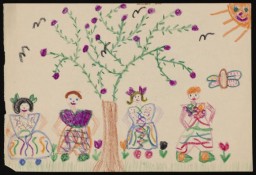<< Previous | Displaying results 771-780 of 6707 for "" | Next >>
-
A page from the Fenyves family cookbook
ArtifactSteven Fenves (born Fenyves) and his family lived in Subotica, Yugoslavia. His father, Lajos, managed a publishing house and his mother, Klári (Klara), was a graphic artist. In April 1941, Subotica fell under Hungarian occupation. Until May 1944, the Fenyveses lived in one corner of their apartment while Hungarian officers took over the rest of the family’s home. In March 1944, Germany occupied Hungary. In April, Lajos was deported to the Auschwitz camp in German-occupied Poland. Steven, his sister…
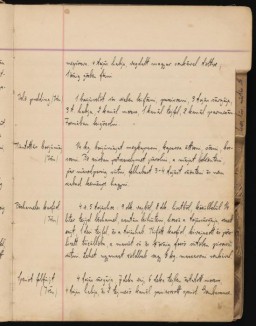
-
Another page from the Fenyves family cookbook
ArtifactSteven Fenves (born Fenyves) and his family lived in Subotica, Yugoslavia. His father, Lajos, managed a publishing house and his mother, Klári (Klara), was a graphic artist. In April 1941, Subotica fell under Hungarian occupation. Until May 1944, the Fenyveses lived in one corner of their apartment while Hungarian officers took over the rest of the family’s home. In March 1944, Germany occupied Hungary. In April, Lajos was deported to the Auschwitz camp in German-occupied Poland. Steven, his sister…
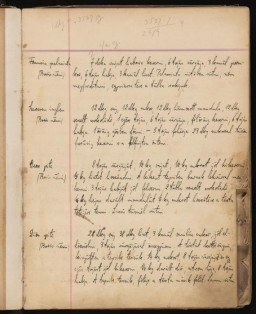
-
Additional page from the Fenyves family cookbook
ArtifactSteven Fenves (born Fenyves) and his family lived in Subotica, Yugoslavia. His father, Lajos, managed a publishing house and his mother, Klári (Klara), was a graphic artist. In April 1941, Subotica fell under Hungarian occupation. Until May 1944, the Fenyveses lived in one corner of their apartment while Hungarian officers took over the rest of the family’s home. In March 1944, Germany occupied Hungary. In April, Lajos was deported to the Auschwitz camp in German-occupied Poland. Steven, his sister…
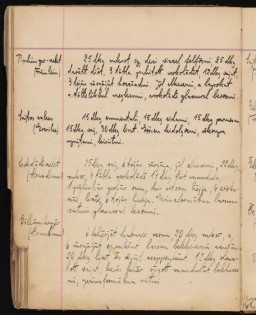
-
First page of Eva Ostwalt's cookbook
ArtifactEva Ostwalt was born in Cologne, Germany, to Jewish parents. She had two younger sisters, Kate and Trude. In 1927, Eva moved with her daughter, Heidemarie, and non-Jewish husband to Dresden. Eva and Karl later divorced, and Eva received custody of Heidemarie. Mother and daughter moved to Merano, Italy. When Eva’s passport expired in 1938, she had to return to Germany. Believing that Heidemarie would be safer with her father, Eva gave custody back to Karl in Dresden. Eva returned to Cologne, where both…
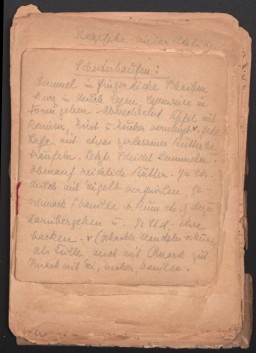
-
Page of recipes from Eva Ostwalt's cookbook
ArtifactEva Ostwalt was born in Cologne, Germany, to Jewish parents. She had two younger sisters, Kate and Trude. In 1927, Eva moved with her daughter, Heidemarie, and non-Jewish husband to Dresden. Eva and Karl later divorced, and Eva received custody of Heidemarie. Mother and daughter moved to Merano, Italy. When Eva’s passport expired in 1938, she had to return to Germany. Believing that Heidemarie would be safer with her father, Eva gave custody back to Karl in Dresden. Eva returned to Cologne, where both…
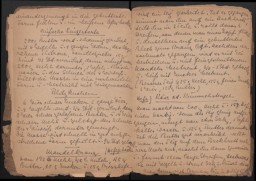
-
Recipes from Eva Ostwalt's cookbook
ArtifactEva Ostwalt was born in Cologne, Germany, to Jewish parents. She had two younger sisters, Kate and Trude. In 1927, Eva moved with her daughter, Heidemarie, and non-Jewish husband to Dresden. Eva and Karl later divorced, and Eva received custody of Heidemarie. Mother and daughter moved to Merano, Italy. When Eva’s passport expired in 1938, she had to return to Germany. Believing that Heidemarie would be safer with her father, Eva gave custody back to Karl in Dresden. Eva returned to Cologne, where both…
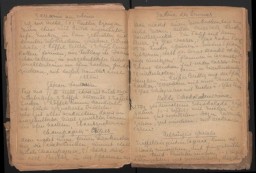
-
Cover of Stanislava Roztropowicz's diary
ArtifactStanislava Roztropowicz kept a diary from 1943-1944. In it, she describes her family's decision to hide an abandoned Jewish girl, Sabina Heller (Kagan). Sabina Kagan was an infant when SS mobile killing squads began rounding up Jews in her Polish village of Radziwillow in 1942. Her parents persuaded a local policeman to hide the family. The policeman, however, soon asked the Kagans to leave but agreed to hide baby Sabina. Her parents were captured and killed. Sabina was concealed in a dark basement,…
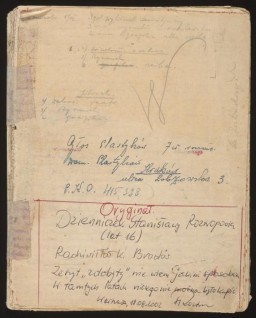
-
Page from Stanislava Roztropowicz's diary
ArtifactStanislava Roztropowicz kept a diary from 1943-1944. In it, she describes her family's decision to hide an abandoned Jewish girl, Sabina Heller (Kagan). Sabina Kagan was an infant when SS mobile killing squads began rounding up Jews in her Polish village of Radziwillow in 1942. Her parents persuaded a local policeman to hide the family. The policeman, however, soon asked the Kagans to leave but agreed to hide baby Sabina. Her parents were captured and killed. Sabina was concealed in a dark basement,…
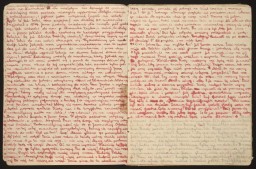
-
Back cover of Stanislava Roztropowicz's diary
ArtifactStanislava Roztropowicz kept a diary from 1943-1944. In it, she describes her family's decision to hide an abandoned Jewish girl, Sabina Heller (Kagan). Sabina Kagan was an infant when SS mobile killing squads began rounding up Jews in her Polish village of Radziwillow in 1942. Her parents persuaded a local policeman to hide the family. The policeman, however, soon asked the Kagans to leave but agreed to hide baby Sabina. Her parents were captured and killed. Sabina was concealed in a dark basement,…
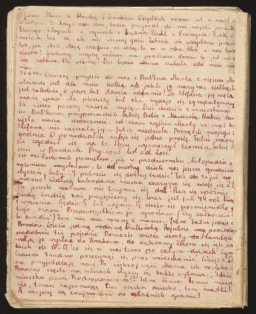
-
Children's art: Drawing of people in a garden
ArtifactAlice Goldberger (1897-1986) was born in Berlin, Germany. Trained as a youth-work instructor, she ran a shelter for disadvantaged children and their families. When Hitler came to power, Alice, who was Jewish, had to give up her post. She immigrated to England in 1939. When war broke out, Alice was interned on the Isle of Man as an enemy alien. While there, she organized a children's facility.Hearing of Alice's work in the camp, psychoanalyst Anna Freud (daughter of Sigmund Freud) intervened to secure her…
